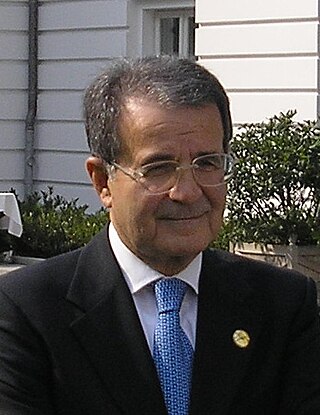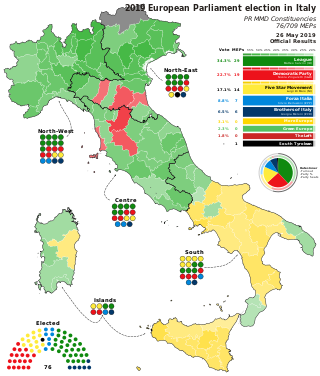
The Federation of the Greens, frequently referred to as Greens (Verdi), was a green political party in Italy. It was formed in 1990 by the merger of the Federation of Green Lists and the Rainbow Greens.

The Italian Republican Party is a political party in Italy established in 1895, which makes it the oldest political party still active in the country. The PRI identifies with 19th-century classical radicalism, as well as Mazzinianism, and its modern incarnation is associated with liberalism, social liberalism, and centrism. The PRI has old roots and a long history that began with a left-wing position, being the heir of the Historical Far Left and claiming descent from the political thought of Giuseppe Mazzini and Giuseppe Garibaldi. With the rise of the Italian Communist Party and the Italian Socialist Party (PSI) to its left, it was associated with centre-left politics. The early PRI was also known for its anti-clerical, anti-monarchist, republican, and later anti-fascist stances. While maintaining those traits, during the second half of the 20th century the party moved towards the centre on the left–right political spectrum, becoming increasingly economically liberal.

The Party of Italian Communists was a communist party in Italy established in October 1998 by splinters from the Communist Refoundation Party (PRC). The split was led by Armando Cossutta, founder and early leader of the PRC, who opposed Fausto Bertinotti's leaderhip and, especially, his decision to withdraw support from Romano Prodi's first cabinet. In December 2014, the party was transformed into the Communist Party of Italy (PCd'I), which would later evolve into the new version of the Italian Communist Party (PCI).

Pier Ferdinando Casini is an Italian politician. He served as President of the Chamber of Deputies from 2001 to 2006.

The Trentino Tyrolean Autonomist Party is a regionalist, autonomist, Christian-democratic and centrist political party in Trentino, Italy. The PATT, heir of the Trentino Tyrolean People's Party, is the unofficial counterpart of the South Tyrolean People's Party (SVP), active in South Tyrol. The two are members of the European People's Party (EPP) and usually contest general and European Parliament elections together.

Socialist Unity was a social-democratic political alliance in Italy which participated in the key 1948 general election, which decided the post-war direction of Italy.

The Segni Pact, officially called Pact of National Rebirth, was a Christian-democratic, centrist and liberal political party in Italy. The party was founded and named after Mario Segni, a former member of the Christian Democrats who was a prominent promoter of referendums.

The 1994 Italian general election was held on 27 and 28 March 1994 to elect members of the Chamber of Deputies and the Senate of the Republic for the 12th legislature. Silvio Berlusconi's centre-right coalition won a large majority in the Chamber of Deputies but just missed winning a majority in the Senate. The Italian People's Party, the renamed Christian Democracy (DC), which had dominated Italian politics for almost half a century, was decimated. It took only 29 seats versus 206 for the DC two years earlier—easily the worst defeat a sitting government in Italy has ever suffered, and one of the worst ever suffered by a Western European governing party.

The Ladin Autonomist Union is a minor progressive-centrist political party in Trentino, Italy, that seeks to represent the Ladin minority in the Province and especially that living in Fassa Valley. Its main leader is Giuseppe Detomas.

The second Berlusconi government was the 57th government of the Italian Republic and the first government of the XIV Legislature. It took office following the 2001 elections, and held office from 11 June 2001 until 23 April 2005, a total of 1,412 days, or 3 years, 10 months and 12 days. It held office for the longest period in the history of the Republic, and for the second longest period in the history of unified Italy since 1861. During its long tenure, its composition changed significantly. Following the poor performance of the centrist parties in the Italian regional elections of 2005, most of the ministers of the Union of Christian and Centre Democrats and the New PSI resigned from the government, which was succeeded by the third Berlusconi government.

The Associative Movement of Italians Abroad is an Italian political party representing Italians abroad. Based in Argentina and active mainly in South America, the MAIE is a centrist party.

Ignazio Benito Maria La Russa is an Italian politician who is serving as president of the Senate of the Republic since 13 October 2022. He is the first politician with a neo-fascist background to hold the position of President of the Senate, the second highest-ranking office of the Italian Republic.

Lombardy renewed its delegation to the Italian Senate on April 9, 2006. This election was a part of national Italian general election of 2006 even if, according to the Italian Constitution, every senatorial challenge in each Region is a single and independent race.

Populars for Italy is a Christian-democratic political party in Italy led by Mario Mauro, minister of Defence in Letta Cabinet and, previously, long-serving MEP for Forza Italia.

Democratic Centre is a centrist, Christian leftist and social-liberal political party in Italy. Most of its members, including its leader Bruno Tabacci, are former Christian Democrats. Since its beginnings, the CD has been also part of the centre-left coalition, centred around the Democratic Party (PD).

Lombardy renewed its delegation to the Italian Senate on February 24, 2013. This election was a part of national Italian general election of 2013 even if, according to the Italian Constitution, every senatorial challenge in each Region is a single and independent race.
The centre-right coalition is a political alliance of political parties in Italy active under several forms and names since 1994, when Silvio Berlusconi entered politics and formed the Forza Italia party. It has mostly competed with the centre-left coalition. It is composed of right-leaning parties in the Italian political arena, which generally advocate tax reduction and oppose immigration, and in some cases are eurosceptic.
The centre-left coalition is a political alliance of political parties in Italy active under several forms and names since 1995, when The Olive Tree was formed under the leadership of Romano Prodi. The centre-left coalition has ruled the country for more than fifteen years between 1996 and 2022; to do so, it had mostly to rely on a big tent that went from the more radical left-wing, which had more weight between 1996 and 2008, to the political centre, which had more weight during the 2010s, and its main parties were also part of grand coalitions and national unity governments.
In the years running up to the 2022 Italian general election, held on 25 September, various organisations carried out opinion polls to gauge voting intention in Italy. Results of such polls are given in this article. The date range is from after the 2018 Italian general election, held on 4 March, to 9 September 2022. Poll results are reported at the dates when the fieldwork was done, as opposed to the date of publication; if such date is unknown, the date of publication is given instead. Under the Italian par condicio law, publication of opinion polls is forbidden in the last two weeks of an electoral campaign.

The 2019 European Parliament election in Italy were held on 26 May 2019, electing members of the 9th Italian delegation to the European Parliament as part of the European elections held across the European Union.

















